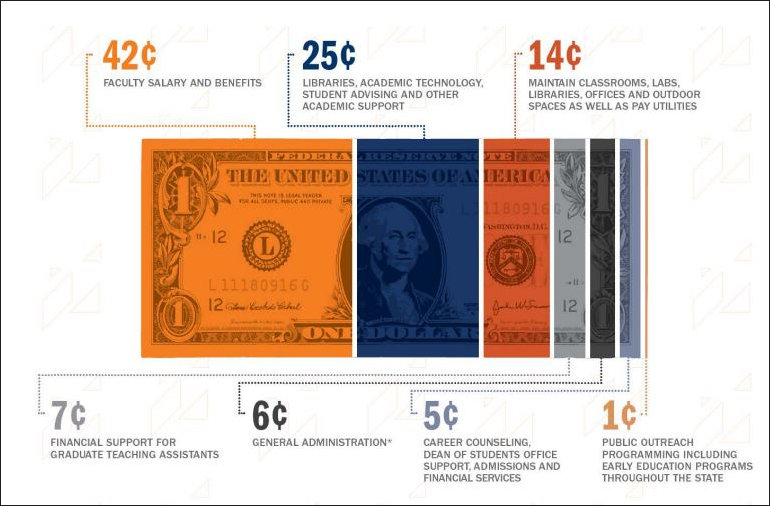Later this week the University of Virginia Board of Visitors will consider increasing tuition by 3% to 4% in the 2020-21 school year and jacking up fees between 3% to 6%. Here is a copy of the PowerPoint presentation showing the arguments and data that the administration presented the board in its November meeting.
As usual, the UVA administration blames tuition increases on declines in state support for higher education. “Responsibility for funding educational costs has shifted from the taxpayer to the student,” states one slide. “Increases in tuition have not kept pace with declines in general funds, leaving a gap of $3,648 per student in 2020-2021.”
While those numbers may justify tuition increases in previous decades — UVa bases its calculations on trends going back to 1990-91 — it overlooks the fact that between 2012 and 2018 (the latest year for which I could obtain data from UVa’s annual financial reports), state support increased by $20 million even while academic (non-hospital) spending increased by $511 million! (See support for these numbers here.) The state is to blame for higher tuition? Really? In what universe?
The UVA administration assumes that the General Assembly will hold state support constant in 2020-21 while the university faces continued cost increases: $8.6 million for faculty merit increases, $8.4 million for staff merit increases, and $14.9 million inflationary cost for non-personal services.
Question: If the major cost drivers, faculty and staff salaries, are increasing 3% and non-personal services are increasing 2%, how do you justify a tuition increase of up to 4% and fees of up to 6%?
Here’s another question: Refer to the chart above, taken from the UVa Powerpoint presentation to the board. The breakdown of costs attributes 42% of every dollar to faculty salary and benefits. Do you see a comparable breakdown for “staff salary and benefits?” No, either do I. The only hint of staff costs appears in the 6 cents for “general administration.” Six percent for administrative overhead doesn’t sound so bad. But if the administration needs an extra $8.4 million for staff raises — almost identical to the $8.6 million in faculty raises — one must conclude that staff in actuality constitutes about 40% of total cost. In other words, the full cost of administrative overhead is marbled through all the other categories seen in the breakdown.
Has the cost of administrative overhead, either in absolute numbers or percentage terms, increased or decreased over the years? The UVa administration does not seem to think such a question worthy of asking. Nor does it provide data that allows us to calculate the answers.
Similarly, has the cost of faculty, either in absolute numbers or percentage terms, increased or decreased over the years? That question seems especially relevant in the context of the fact that 7% of academic expenditures go to graduate teaching assistants. What is the trend line for faculty productivity? How much work are faculty members dishing off to grad students? Again, the administration does not see fit to ask the question, much less answer it.
Meanwhile, let’s look at some other areas where UVa is spending more money. Here are projects funded by the university’s 100%-discretionary Strategic Investment Fund:

Do you see any funds in there designed to promote affordability? Gee, neither do I.
We also read in a press release yesterday that UVa has joined the College of William & Mary to achieve the goal of becoming carbon neutral by 2030. The partnership is part of UVa’s 2020-30 Sustainability Plan, which also will be presented to the Visitors this week. Nowhere does the press release include a dollar figure on how much the initiative will cost or where the money will come from.
Clearly, UVa has many different priorities — holding the line on tuition simply isn’t one of them.
The UVa Board of Visitors has a lot of really smart, successful people. You’d think one or two would ask President Jim Ryan some tough questions about burgeoning expenditures and ever-higher tuition & fees. I look forward to seeing the media coverage of the board meeting later this week. I’d love to read that someone broke ranks and held Ryan’s feet to the fire. But I’m not counting on it.


Leave a Reply
You must be logged in to post a comment.